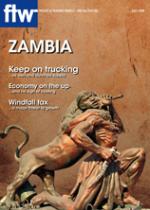THERE IS a major threat to further economic growth
and development in Zambia. The government has
introduced a windfall tax which means that if the
price of copper increases over a certain amount then
the percentage of tax on revenue increases as well.
This is an additional tax over and above the regular
tax payable by the copper mines. Hypothetically, even
if a mine is running at a loss, it will have to pay tax if
the price of copper goes above a certain price.
According to a source in the freight industry, the
tax has been instituted as the Zambian government
feels it cannot trust the financials of mines, that costs
are inflated and auditors collude in the process. He
notes that this is effectively shortening the lifespan
of mines.
When the tax was introduced at the beginning of
2008 the mines tried to fight it but the government
introduced it regardless of their concerns. All previous
agreements between the government and the mines
have therefore become null and void and the new tax
is now law.
Most of the industry sources contacted by FTW
expressed concern about the negative effect the
windfall tax could have on freight transport as the
mines were likely to cancel contracts to save on costs.
A senior mining official confirmed that the
windfall tax was introduced unilaterally, effectively
raising the tax rate of copper mines to 70%. He said
that the mines were willing to renegotiate, provided
the original teams were in place and the process was
completely transparent. Their request was ignored
and four mines have since put in legal letters of
dispute for international arbitration as the new tax is
not in the letter or spirit of the original development
agreement with the Zambian government. He does,
however, add that it seems as if the government is
backtracking but since it has already been signed into
law there is a major problem.
The negative effects for the entire economy
cannot be ignored. The mines are forecasting
production of 600 000 tons of copper this year;
before privatisation the country only produced
250 000 tons. Over US$3 billion have been
invested in the country by mining houses but by
implementing the windfall tax, the government is
forcing capital expenditure to come to a grinding
halt. The official warns that if the issue is not resolved
soon, the mining houses will move their capital to the
DRC and other neighbouring countries.
Windfall tax threatens Zambia’s booming copper industry
31 Jul 2008 - by Staff reporter
0 Comments
Zambia 2008

31 Jul 2008
31 Jul 2008
31 Jul 2008
31 Jul 2008
31 Jul 2008
31 Jul 2008
Border Beat
Poll
Featured Jobs
New
